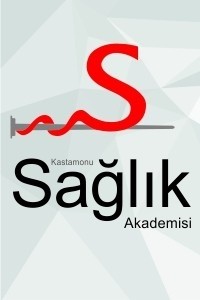Hemşirelik Öğrencilerinin Sağlıklı Yaşam Becerilerinin Değerlendirilmesi: Betimsel Bir Araştırma
Sağlık, Sağlık Tutumu, SağlıklıYaşam Tarzı, Hemşirelik Öğrencileri
Assessment of Healthy Life Skills in Nursing Students: A Descriptive Study
Nursing Students, Health, Health Behaviors, Healthy Life Styles,
___
- Al‐Kandari, F., Vidal, V.L., Thomas, D. (2008). Health-promoting lifestyle and body mass index among college of nursing students in Kuwait: a correlational study. Nursing and Health Sciences, 10, 43-50. doi:10.1111/j.1442-2018.2007.00370.x
- Alpar, S. E, Senturan, L., Karabacak, U., Sabuncu, N. (2008). Change in the health promoting lifestyle behavior of Turkish University students from beginning to end of nurse training. Nurse Education in Practice, 8:382–388.
- Bakir, N., Yangin, H.B. (2019). The relationship between premenstrual syndrome and healthy lifestyle among university students. Life Skills Journal of Psychology, 3(5), 39-51. doi: https://doi.org/10.31461/ybpd.538946
- Biktagirova, G.F., Kasimova, R.S. (2016). Formation of university students' healthy lifestyle. International Journal of Environmental & Science Education, 11(6), 1159-1166. Borle, P.S., Parande, M.A., Tapare, V.S., Kamble, V., Bulakh, P. (2017). Health-promoting lifestyle behaviours of nursing students of a tertiary care institute. Int J Community Med Public Health, 4(5), 1768-1773. doi: http://dx.doi.org/10.18203/2394-6040.ijcmph20171799
- Boylu, A., Pacacioglu, B. (2016). Quality of life and indicators. Journal of Academic Researches and Studies, 8(15), 137-150. doi: https://doi.org/10.20990/kilisiibfakademik.266011
- Cihangiroglu, Z., Deveci, S. (2011). Healthy life style behaviours and related influencing factors of the students of Elazig Academy of Health Sciences of Firat University. Firat Medical Journal, 16(2), 78-83.
- Coban, A., Adana, F., Taspinar, A., Arslantas, H. (2017). Measuring the effectiveness of healthy lifestyle behaviors course given to university students. Balikesir Health Sciences Journal, 6(1), 16-21. doi: 10.5505/bsbd.2017.88597
- Darch, J., Baillie, L., Gillison, F. (2019). Preparing student nurses to be healthy role models: a qualitative study, nurse education in practice. Nurse Education in Practice, 40, 1-7. doi: 10.1016/j.nepr.2019.102630
- Erzincanli, S., Zaybak, A., Khorshid, A.L. (2015). Healthy lifestyle behaviors and time-management skills, and factors affected them of nursing students. Journal of Ege University Nursing Faculty, 31(2), 8-25.
- Farhud, D.D. (2015). Impact of lifestyle on health. Iran J Public Health, 44(11), 1442–1444.
- Genc, A., Karaman, F. (2019). Developing of healthy life skills scale in university students. Istanbul Gelisim University Journal of Health Sciences, 7, 656-669. https://doi.org/10.38079/igusabder.496557.
- Hosseini, M., Ashktorab, T., Taghdisi, M.H., Vardanjani, A.E., Rafiei, H. (2014). Health-promoting behaviors and their association with certain demographic characteristics of nursing students of Tehran City in 2013. Glob J Health Sci, 7(2), 264-72.
- Hong, J.F., Sermsri, S., Keiwkarnka, B. (2007). Health-Promoting Lifestyles of Nursing Students in Mahidol University. Journal of Public Health and Development, 5(1): 27-40.
- Hubley, J., Copeman, J. (2013). Practical Health Promotion, 2nd ed. Polity Press.
- Hui, W.H.C. (2002). The health-promoting lifestyles of undergraduate nurses in Hong Kong. J Prof Nurs, 18(2):101-11.
- Kacan, C.Y., Orsal, O. (2019). Evaluation of the level of healthy lifestyle behaviors of nursing students. Duzce University Journal of Health Sciences Institute, 9(1), 19-24. doi: https://doi.org/10.33631/duzcesbed.481144
- Karadeniz, G., et al. (2008). Healthy Lifestyle Behaviors of University Students. TAF Prev Med Bull, 7(6): 497-502
- Khalid, M., Almutairi, K.M., Alonazi, W.B., Vinluan, J.M., Almigbal, T.H., Batais, M.A., et al. (2018). Health promoting lifestyle of university students in Saudi Arabia: a cross-sectional assessment. BMC Public Health, 18, 1093. doi: 10.1186/s12889-018-5999-z
- Megari, K. (2013).Quality of life in chronic disease patients. Health Psychol Res, 1(3), e27, 141-148. doi: 10.4081/hpr.2013.e27
- Mehri, A., Solhi, M., Garmaroudi, G., Nadrian, H., Sighaldeh, S.S. (2016). Health promoting lifestyle and its determinants among university students in Sabzevar, Iran. Int J Prev Med, 7, 65. doi: 10.4103/2008-7802.180411
- Ozyazicioglu, N., Kilic, M., Erdem, N., Yavuz, C., Afacan, S. (2011). Determinants of nursing students' healthy life style. Journal of Human Sciences, 8(2), 277-332 Pawloski, L.R. and Davidson, M.R. (2003). Physical Activity and Body Composition Analysis of Female Baccalaureate Nursing Students. Nurse Education in Practice, 3: 155-162
- Tambag, H., Turan, Z. (2012). The effect of public health nursing lesson on students' healthy lifestyle behaviors. Turkish Journal of Research & Development in Nursing, 1, 46-55
- Tashiro, J. (2002) Exploring health promoting lifestyle behaviors of japanese college women: perceptions, practices, and issues. Health Care Women Int., 23(1): 59-70
- Vranda, M.N. (2009). Development and standardization of life skills scale. Indian Journal of Social Psychiatry, 25(1/2), 17-28
- Wakefield, M.A., Loken, B., Hornik, R.C. (2010). Use of mass media campaigns to change health behaviour. Lancet, 376:1261-1271
- Yildirim, N., Aydin, M., Hayirsever, F., Ankarali, H. (2016). The effectiveness of a health promotion course in a nursing degree program. Dokuz Eylul University Faculty of Nursing Electronics Journal, 9(3), 88-92
- Zaman, R., Hankir, A., Jemni, M. (2019). Lifestyle factors and mental health. Psychiatr Danub, 31(3), 217-220. pmid: 31488729
- Yayın Aralığı: Yılda 3 Sayı
- Başlangıç: 2016
- Yayıncı: Esra DEMİRARSLAN
Hemşirelik Öğrencilerinin Sağlıklı Yaşam Becerilerinin Değerlendirilmesi: Betimsel Bir Araştırma
Funda KARAMAN, Aslı GENÇ, Sultan ÇAKMAK, Ayşe Nur YEREBAKAN
Periostinin Periodontal Dokular Üzerindeki Etkilerinin Değerlendirilmesi
Postoperatif Ağrıda Psikolojik İyi Oluş: Bir Korelasyon Çalışması
Esra MAKAL ORĞAN, Sacide YILDIZELİ TOPÇU
Conhecimento sobre primeiros socorros de servidores de instituições de ensino infanto- juvenil
Amanda CRİSTİNA OLİVEİRA, Cristina BERGER FADEL, Danielle BORDİN, Midiã VANESSA DOS SANTOS SPEKALSKİ, Everson AUGUSTO KRUM, Melina LOPES LİMA
Covid-19'un neden olduğu duyusal kayıpların yaşam kalitesi üzerine ilişkileri
Camille DE MEDEİROS, Andrea SANCHEZ, Fabiana De Souza FORLANDİ, Mayara Caroline Ribeiro ANTONİO-VİEGAS, Munik De Oliveira MORENO, Victoria FACİN
Empatik Eğilim, Özgeci Davranış ve Kan Bağışı
Sebahat ATEŞ, Bektaş TOPCU, Aslıhan ÖZPAY, Ayşe YAZICI
Hemşirelerin İntramüsküler Enjeksiyon Uygulamasında Ventrogluteal Alanı Kullanma Ve Bilgi Durumları
Multimorbidade em idosos brasileiros e a relação com a utilização de serviços de saúde
Danielle BORDİN, Juliana MICHALSKI, Juliana LİGESKİ IUNG BARBOSA, Rodrigo BORDİN, Maria De Lourdes BERNARTT, Melina LOPES LİMA
Doğal Orifislerden Transluminal Endoskopik Cerrahi ve Hemşirelik
